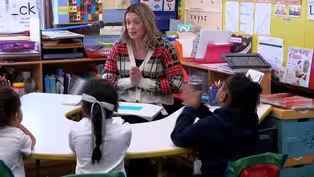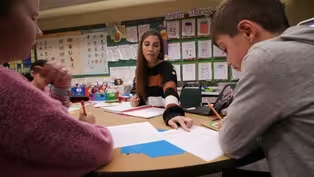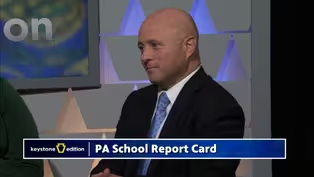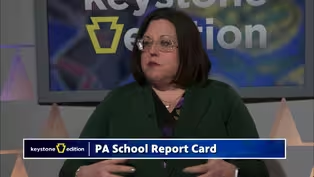Keystone Edition
Tactics for Improving PSSA Scores
Clip: 1/6/2025 | 7m 17sVideo has Closed Captions
The PSSAs are seen as a valuable tool among many for fostering student success
Educators discuss strategies for improving PSSA scores, highlighting the importance of high expectations, consistent culture, and addressing barriers like mental health and food insecurity. Urban districts focus on removing obstacles to learning, while all schools emphasize social-emotional support and data-driven adjustments.
Problems playing video? | Closed Captioning Feedback
Problems playing video? | Closed Captioning Feedback
Keystone Edition is a local public television program presented by WVIA
Keystone Edition
Tactics for Improving PSSA Scores
Clip: 1/6/2025 | 7m 17sVideo has Closed Captions
Educators discuss strategies for improving PSSA scores, highlighting the importance of high expectations, consistent culture, and addressing barriers like mental health and food insecurity. Urban districts focus on removing obstacles to learning, while all schools emphasize social-emotional support and data-driven adjustments.
Problems playing video? | Closed Captioning Feedback
How to Watch Keystone Edition
Keystone Edition is available to stream on pbs.org and the free PBS App, available on iPhone, Apple TV, Android TV, Android smartphones, Amazon Fire TV, Amazon Fire Tablet, Roku, Samsung Smart TV, and Vizio.
Providing Support for PBS.org
Learn Moreabout PBS online sponsorshipWe're finding the stories that impact you.
And you can find us at wvia.org.
- All right, welcome back.
I think I wanna go to you, Greg, here.
If you don't mind, I'll start with you because I think it's probably safe to say, maybe I'll ask Sarah's counsel here, but I think you're fairly high-achieving district and your numbers have looked pretty good in this last round of scores.
What was that like for you to see, what do you think you did in those couple of years to help the school along?
- Yeah, so like I was saying earlier, when we returned and returning to that normalcy was returning to having the same expectations that we've always had.
We've always said that if you're going to have high expectations, you have to lead by high example.
We've always expected from our students that we're here to learn, right?
And we think that having that sort of structure, having that sort of culture where there's a high expectation kind of lends itself to success.
And it has to be something that is consistent across all grade levels from one building to the next building.
It's with fidelity, it just becomes part of what you do.
And I think for the teachers that we have in our district, all of the credit goes to them in truly having a mindset and a respect for that culture, for that expectation of high achievement and just taking the bull by the horns and caring and going forward in a way that's really been super beneficial for our kids.
So, you know, of course we've adopted curriculum, we've made adjustments along the way and we're constantly chasing our tail doing what we need to in that regard.
But I think if you have a baseline, if you have, you know, a foundation upon which all of this is built that is consistent and steady and the message is clear, I think that's really helpful.
- Erin, where do you go from here?
- So I think that in an urban environment, it's a little different sometimes because it's, how do I remove barriers to learning to get kids to be able to come in and focus on school?
And there's just a lot going on in their worlds outside of school sometimes that stop that.
So, one of the things that I'm really proud about the Scranton School District is they took huge steps in the mental health world.
They adopted a social and emotional learning curriculum.
K12, they hired a mental health supervisor, they hired multiple mental health professionals and they've really embedded that into the school district, and it's been a real big success and we're growing it now into tier two and tier three strategies right now.
The other thing that we did was we brought CHOP in, which is the food pantries in all the buildings to take away any kind of food insecurities.
So we kind of started to look at some of those things, but then at the same time, right now we're doing a huge focus on literacy and the science of reading.
We partnered with the Scranton Federation of Teachers through the American Federation of Teachers to do a full, systemic overhaul with, we're starting with our elementary, then building into our secondary.
So everyone has that base knowledge.
And then the other thing I'm really proud about is we partnered with Head Start and we did bring our first Head Start class in just today was the first day for them.
And we're gonna try to grow that program out.
It's a pilot right now, but bringing in that early childhood learning to bring kindergarten readiness into our kids is another huge thing.
So I sometimes, when you're in an urban environment, have to look at what do I need to get away so that when they come to me, I could have that culture and those high expectations and they're not focused on those other things in their outside world?
- I'm glad you brought up social emotional learning 'cause I've heard that term a lot these days and I know you've done some reporting on it.
Tell me a little bit about what that is, what that means.
- Well, I think especially since the pandemic schools are more concerned about the whole child and they have added a lot of mental health services for students and I think you're really seeing the results, right?
- [Greg] Yeah.
- [Julie] Would you say that?
Yeah?
- Yeah, absolutely.
I mean, each district that I'm aware of has outpatient therapy services in the building.
You know, we all have crisis counselors.
We have resources available to students that I think, again, going back to that, having those high expectations, we have to make sure everything's buttoned up and kids have the resources that they need for them to be able to achieve at the level that they can.
But those things that we're discussing on the SEL side, on the emotional support side, it's really important and we're all really doing the best we can to meet those needs.
- And I've heard you bring up food insecurity and I've heard you bring up mental health.
What other barriers are do you most see?
- Primary preventative medical care.
Systemic primary and preventative medical care is always going to be an issue.
The more rural or the more urban you are and accessing those things, in addition to having the services for domestic violence and gang violence, and the other problems that we're seeing in northeastern Pennsylvania right now, which I think have always been there, but are more acute and happening on a more regular basis right now.
So, you know, if a kid's coming from that type of home and has that kind of trauma, we need to make schools the safest place that that child could be, so when they come in, they can focus on what they need to do to learn in that building.
So it's how do you get rid of all of those barriers first to get that kid into a classroom and then have that dynamic teacher in front of them who's going to get them to learn.
- There's so much to think about before you've even gotten to test scores.
I mean, there's so much to think about before you even get the student to sit down and take the test.
- We had talked a little bit about, you know, the things that we're discussing now, and it's like trauma-informed decision making, right?
So every student that comes through the door, actually, not unlike every adult that comes through the door, everybody's got something.
- [Julie] Yeah, sure.
- Right?
Everybody has something.
And we've worked really hard.
I think all of the school districts are trying to get to the bottom of what that thing is and really trying to assist kids the best way that we can to make it the best experience it could be.
- What about WVIA News and the education role here that you now have?
What will you be looking out for?
Are there certain story angles that you're interested in now following?
- Well, really like, I love the idea of exploring like why there are certain schools that are really seeing huge growth and what are they doing, and being able to report on that is really exciting because, you know, maybe it could inspire someone else.
I mean, I truly was inspired spending time in the classrooms I spent time in.
I could have been there all day.
You know, just the teachers were dynamic, the students were wonderful.
There was so much learning happening.
- People don't see that most of the time.
You know, people don't get to see that, I think, in their every day.
So final thoughts here in our last minute or so?
- I think that the PSSAs are really important because it does give us something to achieve and I think it gives us that benchmark that we could then work from.
But like anything, it's a test and we have to look at that test and then we have to look at what we can do to be better from the information we gather in that test.
And then how do we help kids from it?
Because in the end of it, what it comes down to is how do I make my kids better every day that they come into my school?
And how do I give them what they need to go out and be successful?
- I agree.
- I would agree with that and I would add that it should not be viewed as something negative.
I think it is an important tool, and it's one of many tools that we have.
It's not the be all end all, it's not the only assessment we use.
It's not the only thing that we're going to use to measure each district's success, but it's an important part.
If it goes down to the academics, the achievement, you know, the core areas that we think are really critical for any student to achieve as they move forward, this is a great way for us
Improving PSSA Scores and Getting Students Back on Track
Video has Closed Captions
Clip: 1/6/2025 | 2m 49s | WVIA News dives into the lasting effects of COVID-19 on student learning (2m 49s)
PA School Report Card - Preview
Preview: 1/6/2025 | 30s | Watch Monday, January 6th at 7pm on WVIA TV (30s)
PSSA - The Teacher's Perspective
Video has Closed Captions
Clip: 1/6/2025 | 5m 57s | Teachers approach the PSSAs with responsibility but acknowledge the pressure it brings (5m 57s)
Video has Closed Captions
Clip: 1/6/2025 | 4m 21s | These summative assessments measure knowledge against state standards. (4m 21s)
Providing Support for PBS.org
Learn Moreabout PBS online sponsorship
- News and Public Affairs

Top journalists deliver compelling original analysis of the hour's headlines.

- News and Public Affairs

FRONTLINE is investigative journalism that questions, explains and changes our world.












Support for PBS provided by:
Keystone Edition is a local public television program presented by WVIA



